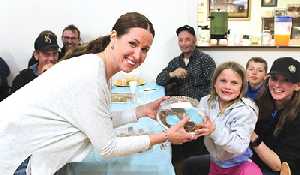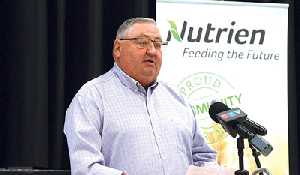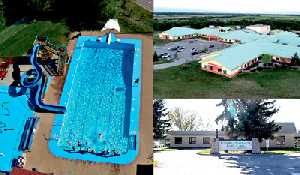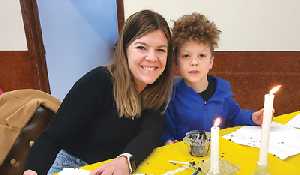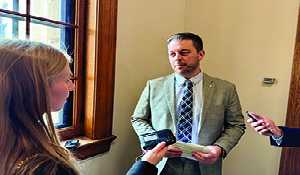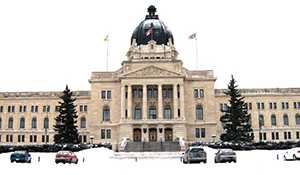Hours reduced at Kipling Memorial Health Centre
November 10, 2012, 10:30 am
Kevin Weedmark


A month after eliminating emergency services at Kipling Memorial Health Centre because of a shortage of physicians, the Sun Country Health Region has now reduced the hours of the facility because of a shortage of nurses.
Starting Nov. 4, the 24-hour health care facility was reduced to operating only 12 hours a day.
"The facility will be open from 7 a.m. to 7 p.m. each day until further notice," said Sun Country CEO Marga Cugnet.
"Due to a shortage of Registered Nurses, we are unable to keep the facility open 24 hours a day. As a result, the building will close at 7 p.m. each night."
Laboratory and x-ray services at the health centre continue to be available on weekdays from 8:30-3 p.m.
Other services at the health centre, such as physiotherapy, home care, mental health and addiction, the dietitian and diabetes program, will continue on weekdays as usual.
Emergency and inpatient services at the health centre were suspended Oct. 1.
"We recognize the difficulties with this additional reduction in service," said Cugnet.
"We continue to pursue all recruitment opportunities for new doctors and nurses. We are working diligently with the Kipling District Health Foundation and the Saskdocs physician recruitment agency to remedy this situation."
Sun Country has suggested patients needing emergency services go to the Arcola Health Centre or the Southeast Integrated Care Centre in Moosomin.
Moosomin MLA Don Toth said he has heard a lot of concerns from Kipling and is trying to address the situation.
"Over the past number of years we've gradually seen a reduction in physician availability and that is certainly impacting our rural communities," he said.
What is the government doing to address the shortages?
"When we first formed government we added training seats at the college," he said. "We are at 100 now which is the maximum because of the availability of teachers, but there's a lag time before those physicians have completed their training and are available.
"In the meantime we have expanded the number of countries we accept physicians from, and we have the SIPPA program (The Saskatchewan International Physician Practice Assessment) to adapt new doctors to Saskatchewan.
We have 24 individuals involved in that, and we're bringing them up to speed as to how they would practice medicine in our system and how to work in rural practice, just so they are not put into a rural setting and find out it's somewhat overwhelming.
"Those 24 were the first of the program, and it's my understanding there are 30 spots available."
He said the province also has other plans to help provide medical services in rural areas.
"As I was chatting with the CEO of Sun Country, I mentioned we're working to make locum pools available," he said.
The province is also offering medical graduates $120,000 that would go toward paying your tuition fees if they work in rural Saskatchewan for a set period.
Toth said that recruiting new physicians involves the local community, the health region, and the province.
"In Kipling, the local health foundation is touching base with people showing interest in coming to the community. I've just been making some inquiries to find out are there ways to help find physicians. I think it's basically working together that works best.
"In Moosomin, with its larger family practice there, the physicians themselves have set up a good network for when they're trying to recruit, but in the smaller communities I think you need community involvement. It's a matter of everyone doing their part.
"I have been in contact with the health foundation, I made some inquiries, I've touched base with Sun Country, said I would touch base with the minister of health and the minister of rural health to see if we can assist them. I will do whatever I can to help recruit physicians to our communities."
While the latest reductions are because of a lack of nurses, Toth said his understanding is that the problem with finding nurses is because of a lack of emergency services and the limited range of services.
Toth said he believes that if another physician is found for Kipling and emergency services are restored, nurses will be available.
He said he believes the SIPPA program could be part of the solution.
"Of the 24 physicians in the SIPPA program, every one of them indicated they would be quite open to rural practice, which is where we need to focus. Over the last few years we've found even our local graduates looking at urban centres.
"I've tried to encourage graduates to look at the Moosomin model of group practice, so they can have some family time.
"I think we can promote some of those ideas to our current students who are saying to themselves, if I go out to rural practice will I be able to handle it."
Toth said the shortage of physicians is becoming more of a problem across the province.
"Unfortunately it's becoming a significant issue," he said.
"I just heard Minister Boyd mention Kindersley has only one doctor and he's leaving. Kipling is in a situation that a lot of towns are in, and Moosomin is really fortunate to be in the position it is in."
The physicians of the Moosomin Family Practice Centre expressed their concerns in a letter to Karen Earnshaw, active vice-president of rural, restorative and continuing care with the Regina Qu'Appelle Health Region.
"Further closure of surrounding hospitals and departure of physicians continues to impact on our facility and ability to provide safe and efficient health care services in a timely manner," the physicians wrote.
"Patients from surrounding areas are advised to use our facility when their facility closes down, without any communication or contingency planning with our physician group." The physicians are asking for the SEICC in Moosomin to be designated a regional hospital, whih would allow it to be staffed by physicians 24 hours a day.
